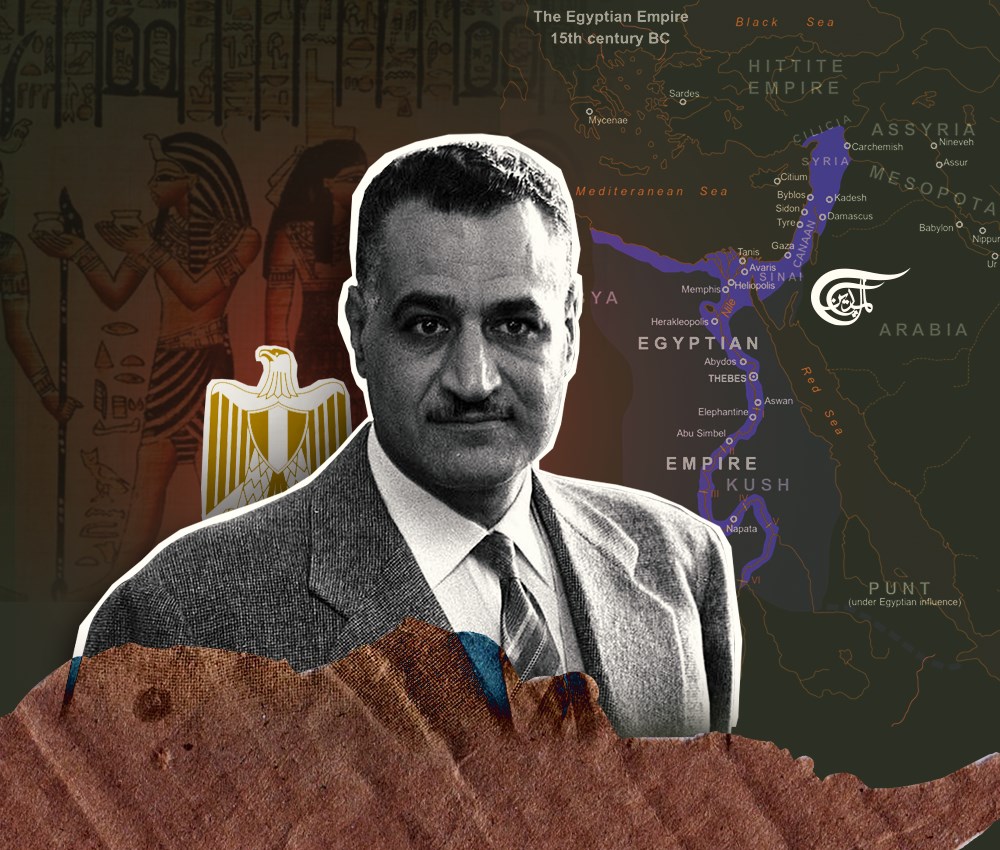Why whoever controls Egypt can control the Arab region?
Whoever looks at Egypt finds that it constitutes the backbone and heart of the Eastern Mediterranean given its geopolitical points and dimensions. So, it was natural for whoever wanted to control this region to control Egypt.
-

Abdel Nasser benefited from the decline of the traditional colonial powers to achieve his success and victory. But the emergence of a new power in the world, including the Eastern Mediterranean, sealed his fate.
Egypt is the oldest political entity in history and its borders have not changed since its unification by the Pharaoh Mena I in the late fourth millennium BC. The country is really the gift of the Nile, as it is formed from barren desert lands crossed by this river from south to north. It is worth mentioning that the Delta is largely the result of the digging of canals by engineers, whose role emerged in ancient Egypt in order to expand the agricultural area. Around the Nile, the Egyptian political system was established, along with the concept of national security, which revolves around defending the nation’s heart, which is the Nile Delta region.
A country centered around the Delta region
Because Egypt is the gift of the Nile, the Egyptians, since ancient times, had to secure the sources of the Nile water. This prompted them to expand their influence south to the heights of Aswan, close to the water sources coming from Sudan. Indeed, the ancient Egyptians were the first to send expeditions to explore the sources of the Nile in the lake that is called today Lake Victoria, as proven by the maps of the ancient Egyptians that were transmitted by geographers such as Ptolemy two thousand years ago, and Al-Sharif Al-Idrisi nine centuries ago.
And because the Delta region is the region from which the Nile branches into a large number of canals, these canals needed a strong central administration close to the place from which they branched, and so were founded the cities of Memphis, then Fustat, then Cairo, which merged in the modern era into one city. This led to the emergence of a highly centralized economic-political-social system around the state that was represented by the pharaoh and priests, who were also state employees.
Lines of defense in the heart of Egypt
Because the delta constituted the heart region, the ancient Egyptians had to defend this region from the west by preventing the incursion of tribes from Libya towards the delta. Western Sahara formed a natural barrier with North Africa, except for a coastal strip that ran through Benghazi. The Tobruk region constituted the place in which Egyptian influence stood at its nearest level, while the ancient Egyptians extended their influence to Tunisia, which constituted a strategic area separating the Libyan coast on the one hand, and the Algerian coast on the other.
In the south, the Aswan region constituted a natural barrier with Sudan, while the northern coast of Egypt constituted the region from which Egypt overlooked the eastern Mediterranean. As for the western coast, it constituted the region from which Egypt overlooked the Red Sea and from it the Indian Ocean. Egypt was attached to the Asian continent through the Suez Isthmus, which Egypt had to defend to prevent the invaders from entering the Delta region, so the lesson that the ancient Egyptians learned, as a result of the Hyksos invasion, was that defending Egypt from the east must pass at its minimum through the Gaza – Beersheba line. Its medium extent would reach the Galilee region, at a farther area between Tripoli in northern Lebanon and Homs in central Syria. As for its maximum extent, it stops at the foothills of the Taurus Mountains in northern Syria.
This made Egypt constitute a geopolitical constant in a region dominated by deserts, barren lands, and plains that extend from the west of the Euphrates region to the foothills of the Atlas Mountains in Morocco, and interspersed with mountains in the Levantine coast region, in the Green Mountain region in Libya, and the high mountains in Yemen. Therefore, whoever looks at Egypt finds that it constitutes the backbone and heart of this vast region given its geopolitical points and dimensions. So, it was natural for whoever wanted to control this region to control Egypt.
Egypt and its international relations
Egypt was stationed on one of the most important global trade routes. The Levant was the region where trade routes from East Asia intersected with the Mediterranean, Europe, and Africa. Egypt was located on a major trade route, which is the link between the eastern Mediterranean and the Indian Ocean through the Red Sea. Therefore, Egypt would flourish whenever it controlled this line, while it would fall prey to the power that controlled the eastern Mediterranean, with the consent of its commercial elites, who were interested in preserving their interests by submitting to the authorities that controlled the eastern Mediterranean.
Therefore, throughout history, when Egypt was strong, it extended its influence over the region stretching from the Levant in the east to the outskirts of Tunisia in the west, and from the coasts of the Mediterranean in the north to Yemen and the Horn of Africa in the south. As for the power that aspired to a leading role in international relations, it had to seek to control Egypt by targeting the aforementioned elements of its national security, especially by separating it from the Levant on the one hand and controlling trade in the eastern Mediterranean on the other.
Egypt Under Nasser
If we go back to the recent experience of Egypt in trying to extract an independent role during the time of Gamal Abdel Nasser (1952-1970), we find that Egypt benefited from an international circumstance in which the power of Great Britain was retreating and losing its grip on most of the regions it was controlling in the world, including the eastern region. This allowed Egypt to extend its influence over the eastern Mediterranean region, especially after the nationalization of the Suez Canal in the summer of 1956, which made Egypt regain its role as the master of trade between the eastern Mediterranean and the Indian Ocean.
In parallel, Egypt had begun to support liberation movements in the Arab world, starting from 1954. It supported independence movements in Tunisia and Morocco, which became independent in 1956, and in Mauritania, which became independent in 1960. It also supported the Algerian revolution, which became independent in 1962, in addition to supporting the liberation of the Arab Gulf region, Yemen, and the Sultanate of Oman, not to mention Egypt's support for the liberation movement in Africa. Less than a decade after Gamal Abdel Nasser took power in Egypt, the map of the Arab and African world had changed radically from a map dominated by European colonial powers to a map of newly independent countries seeking to build their national capabilities.
Abdel Nasser benefited from the decline of the traditional colonial powers to achieve his success and victory. But just as he benefited from the retreat of Great Britain's grip on the eastern Mediterranean and the Indian Ocean to achieve these victories, the emergence of a new power in the world, represented by the United States, and its control over the world's maritime shipping routes, including the eastern Mediterranean and the Indian Ocean sealed the fate of Nasser. This has been evident when the United States decided to send the Sixth Fleet to be stationed in the eastern Mediterranean after the Iraqi revolution in 1958, in addition to the Lebanese events that broke out in the same year.
This was followed by the separation of Syria from the United Arab Republic in the summer of 1961, then the involvement of Egypt in the Yemen war, leading to the coordination of the United States and Saudi Arabia for an attempted coup by the Muslim Brotherhood in 1965. When this coup failed, the United States supported "Israel" in its aggression against Syria, Egypt, and Jordan in 1967, which directed a severe blow to Abdel Nasser. However, the latter did not surrender and fought a war of attrition and began preparing for a war of liberation of the occupied territories, but he died in 1970, leaving Anwar Sadat in power to lead Egypt under US influence.
Conclusion
Anwar Sadat's accession to power in Egypt constituted a coup against Nasser’s policies. With Egypt's entry under the US influence, especially after 1974, most of the Arab region entered fully or partially under the US influence. This was a prelude to the victory of the United States in the Cold War against the Soviet Union in 1989, which led to the dissolution of the Soviet Union in 1991 and the opening of a new era in international relations that would pave the way for US hegemony over international politics for three decades until new powers such as China, Russia, Iran and others emerged on the scene to challenge US hegemony.

 Jamal Wakim
Jamal Wakim
 8 Min Read
8 Min Read











